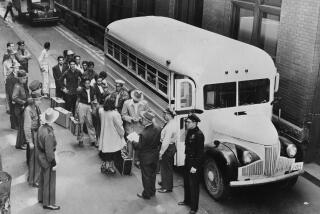Ruling in San Diego May Mean Removal of Cross on Mt. Soledad
SAN DIEGO — A Superior Court judge on Friday declared unconstitutional a July ballot measure aimed at preventing the removal of a cross atop Mt. Soledad, the latest twist in a 16-year court battle.
Judge Patricia Y. Cowett invalidated the voter-approved measure that would have kept the 43-foot-tall cross in place by transferring the city-owned land to the federal government so the site can become a national monument.
Cowett said the measure was unconstitutional because the cross, dedicated in 1954, is clearly a religious symbol and not, as its supporters claim, a monument to military veterans.
Transferring the land would be an unconstitutional preference for a specific religion, Cowett ruled. In a 35-page decision, she said calling the cross a monument to veterans “at worst is but a sham.”
Supporters of the cross vowed to appeal, although it is unclear whether they will have legal standing to continue the case.
“This is an important fight,” said attorney Charles LiMandri. “I want my kids to live in a community that has respect and reverence for veterans.”
LiMandri said Cowett’s ruling was faulty because she cites only cases involving sites where crosses are standing alone. Mt. Soledad’s cross site has six walls with 1,600 plaques honoring veterans. The oldest plaques date from the mid-1990s.
LiMandri and other activists have said that removing the Mt. Soledad cross could spark other lawsuits aimed at taking down crosses from historic battlefields like Gettysburg.
James McElroy, attorney for Philip Paulson, a military veteran and atheist who sued to force the cross’ removal, said he hoped Cowett’s ruling would put an end to the court case.
Starting in 1991, federal courts have ruled that the cross violates the separation of church and state. But each ruling had been appealed.
“I’m hopeful that our very ugly, very divisive, very expensive, very shameful episode of trying to buck the law and court decisions is now over,” McElroy said.
McElroy said cross supporters probably will not be allowed to file an appeal because they were not part of the case. He sued the city clerk after the clerk approved putting the measure on the ballot.
LiMandri entered the case at the request of City Atty. Michael Aguirre, and it was unclear Friday whether Aguirre will permit him to appeal on behalf of the city.
In a community with more active-duty military than any other in the country, political support for the cross is strong. The July measure was approved by 75% of voters.
The San Diego City Council has twice tried to skirt the legal issue of separation of church and state by arranging for the land beneath the cross to be sold.
But each time, the federal courts have ruled the sales were rigged in favor of groups that pledged to keep the cross atop Mt. Soledad, the highest peak in the city, which makes it one of the most visible sites in San Diego.
In December, President Bush approved a resolution by Reps. Duncan Hunter (R-El Cajon) and Randy “Duke” Cunningham (R-Rancho Santa Fe) authorizing the federal government to accept the property from the San Diego City Council.
But the council, weary of the long legal fight, voted 5 to 3 in March not to transfer the property. That led cross supporters to gather 89,000 signatures to put the measure on the July ballot.
Wells Lyman, president of the San Diego County Bar Assn., said he would not be surprised if there were further efforts to save the cross.
“The people on both sides in this case are passionate,” said Lyman, who was not aligned with either side.
More to Read
Sign up for Essential California
The most important California stories and recommendations in your inbox every morning.
You may occasionally receive promotional content from the Los Angeles Times.










